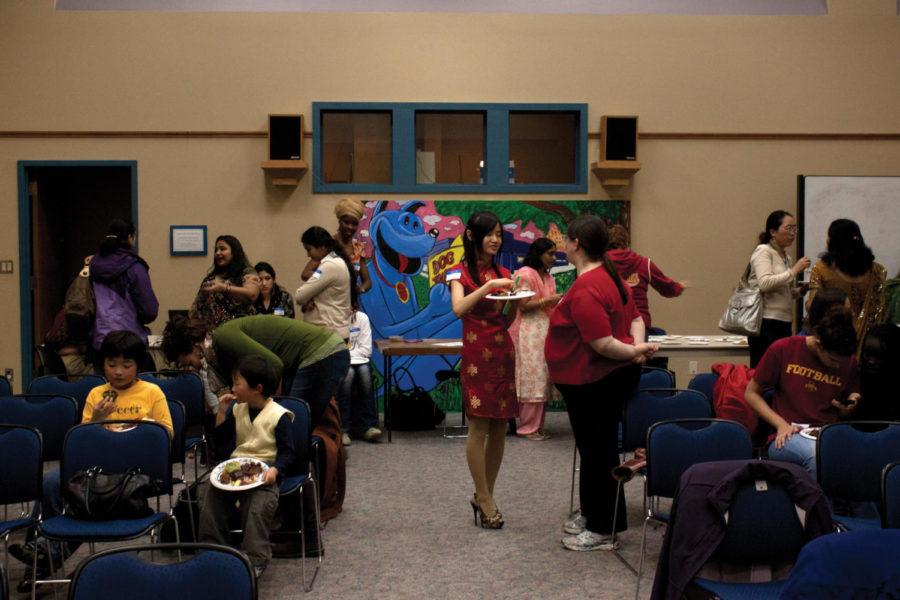International Women’s Day hosts panel for women to share experiences
March 4, 2012
People of all genders, ages and ethnicities gathered at Ames Public Library on Saturday in celebration of International Women’s Day.
A panel of four women, each from a different country, joined the stage to tell the audience about their own experiences in each of their countries. Daniela Dimitrova, associate professor of journalism and communication and moderator for the panel, asked various questions in four specific areas: education, dating and marriage, work opportunities and how each woman celebrates the day in each of their countries.
Shengnan Qian, senior in finance, was the first to speak. She is from China.
Qian said the Chinese education system is very similar to the system in the U.S., but there are a few differences.
“We always have our own classroom and classmates and always stay in the same room,” she said. “The teachers come to us and teach different courses.”
In her grandparent’s generation, it was uncommon for women to go to college. Now, more people are allowed to go to college and social customs such as dating are more acceptable.
In the past, Qian said matchmakers were commonly used. Families would come together to meet each other and talk about family backgrounds. If the families agreed with each other, they would get married. Now, marriage traditions are more Westernized.
“We can find someone we like,” Qian said.
China also has more equal opportunities for women now than in the past.
“If the woman has the ability to be responsible, they can work,” Qian said. “There aren’t gender issues between men and women.”
Anicia Peters, graduate student in supply chain and information systems, is from Namibia. She spoke after Qian about her experiences.
Because of Apartheid, schools were racially segregated and black Namibians were not allowed to learn science or English. Many could not complete high school or even go to high school.
After struggling to gain admission to a school for black Namibians, Peters said she realized, “I’m talented, I’m gifted and yet I’ll leave one day without any college education.”
She decided to go to college after getting married.
Before Namibia gained independence, Peters said parents would see sending girls to school as a waste of resources. The Namibian government changed the law to enforce everyone to go to school until at least the age of 16.
“Today, it’s more or less equal for men and women to get an education,” Peters said.
Dating is not something that is restricted in Namibia. However, domestic violence is a real issue in the country. Peters said that as a child, she would play a game called “Kamma” — meaning “make believe” — where the pretend husband would come home drunk and beat the pretend wife.
“[We] didn’t say anything about it because that’s how society was,” she said. “We didn’t see anything wrong with it.”
The Affirmative Action Act was passed in Namibia after Apartheid, where women, disabled people and previously disadvantaged people were preferred for employment over other candidates.
Following Peters, Abyoana Shrestha, who is from Nepal, spoke. Shrestha said that in her country, Nepali girls are not educated. Only the male child of the family is allowed to go to school. Shrestha’s parents taught her from home.
In the past, dating was viewed as a sin and was not allowed. Now, with cultural shifts in society, the world of dating is changing.
Government laws also have been changing to give women more employment opportunities. They are working to give women and men equal opportunity.
Kaukab Marchant, from Pakistan, was the last speaker. She comes from a highly educated family, where education was stressed and family members were expected to go to college.
“Women’s education is very important,” Marchant said. “Every family wants to give education to their children.”
Marchant said every province of Pakistan has a different culture and way of dating.
“My marriage was arranged … in 15 days,” she said. “In these days, more children are dating because they are going to college and they find the best person for them.”
Because of the war in Nepal, the employment rate has been lower than in previous years. Even with degrees, many people cannot get jobs.
Women from different countries have come a long way since International Women’s Day started in the early 1900s.
“I was one of the original founders of this group, and I congratulate you on how far you’ve all come,” said Irene Switzer, an elderly community member, after the event had ended. “[International] women reach out more now. In those days they would tend to isolate themselves more to their own countries.”
Jane Edwards is a retired advisor for international students. She was a volunteer for the event.
“International Women’s Day is very special,” she said. “The most joy I receive is from seeing interaction from different cultures.”







